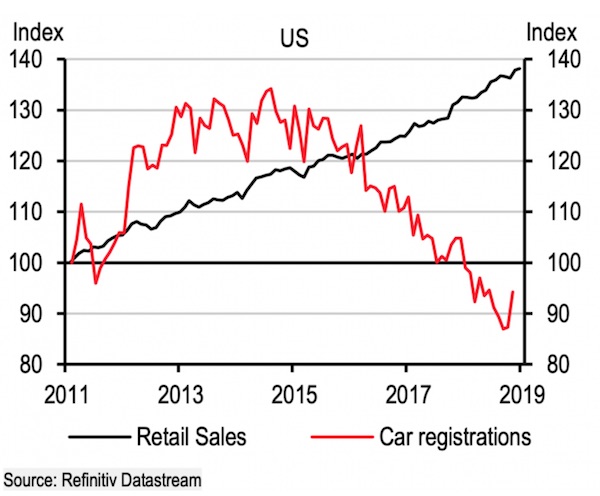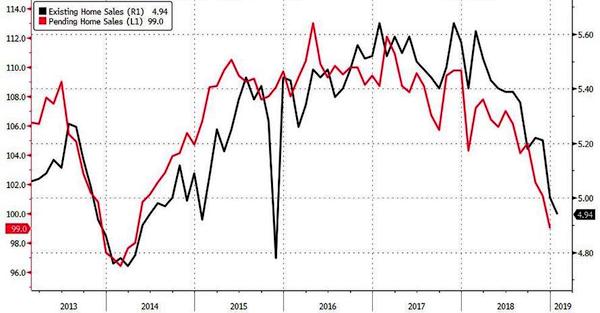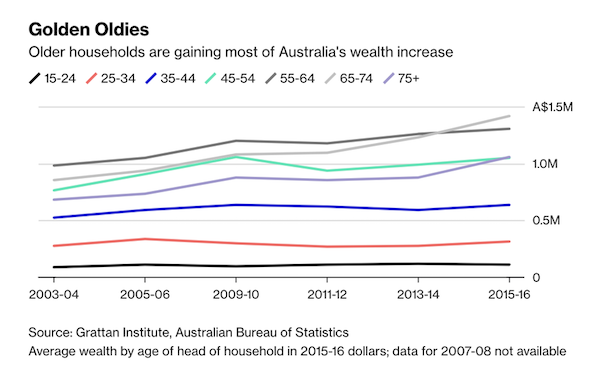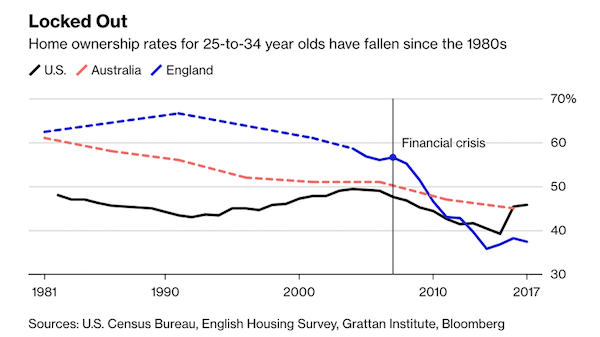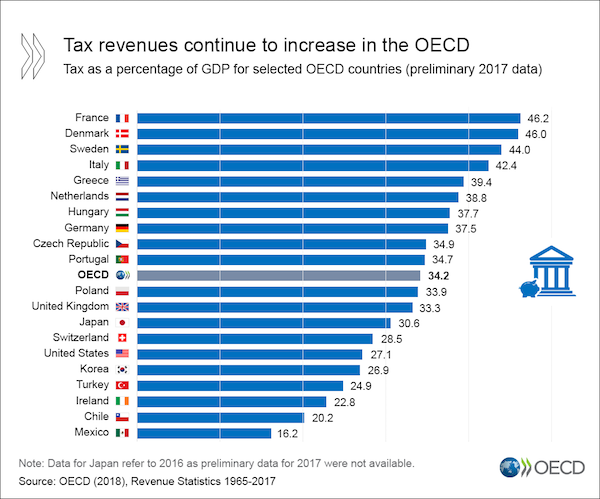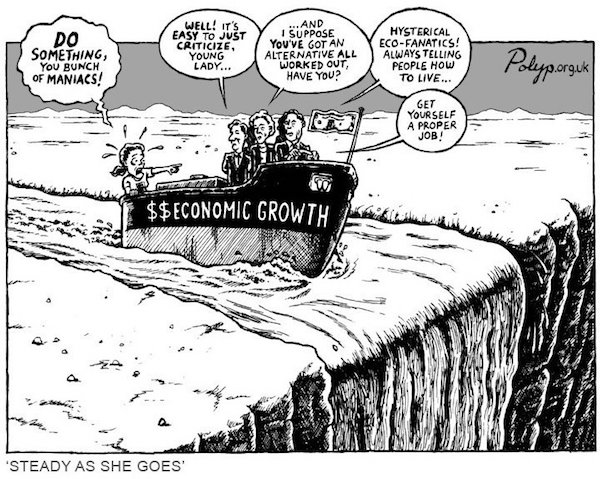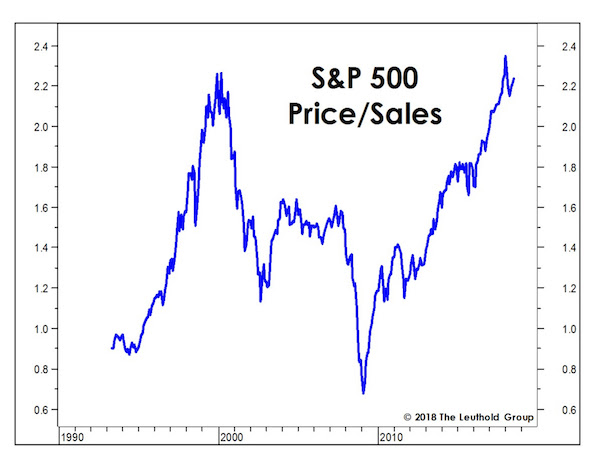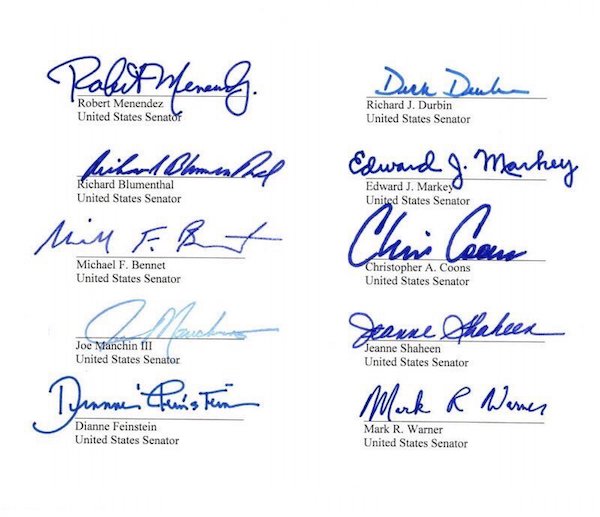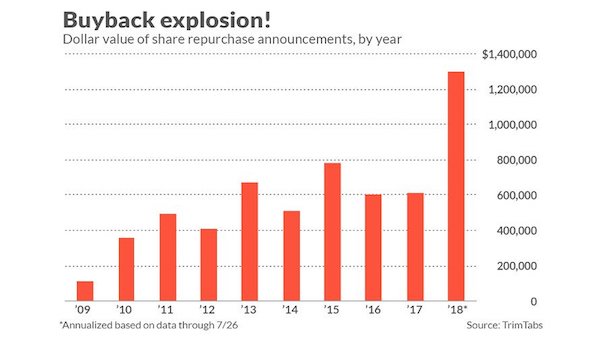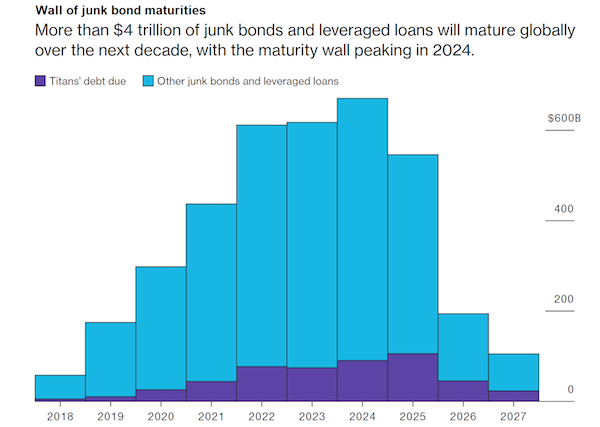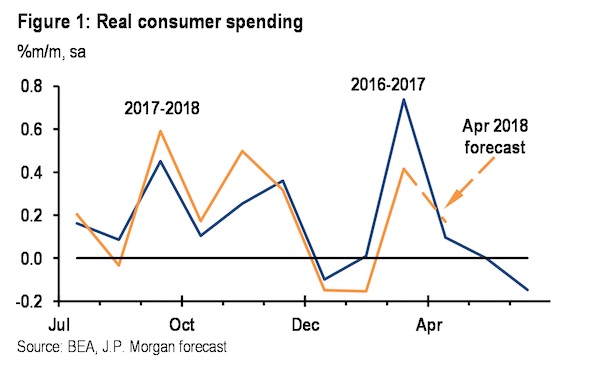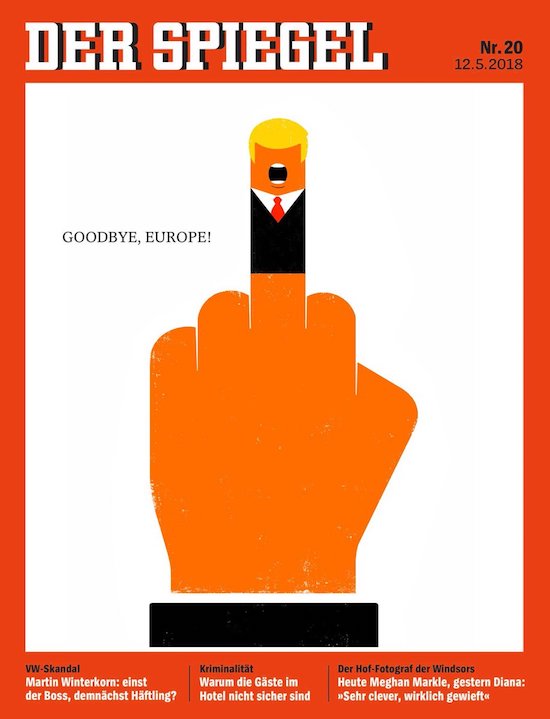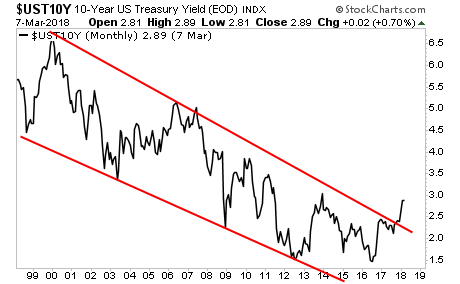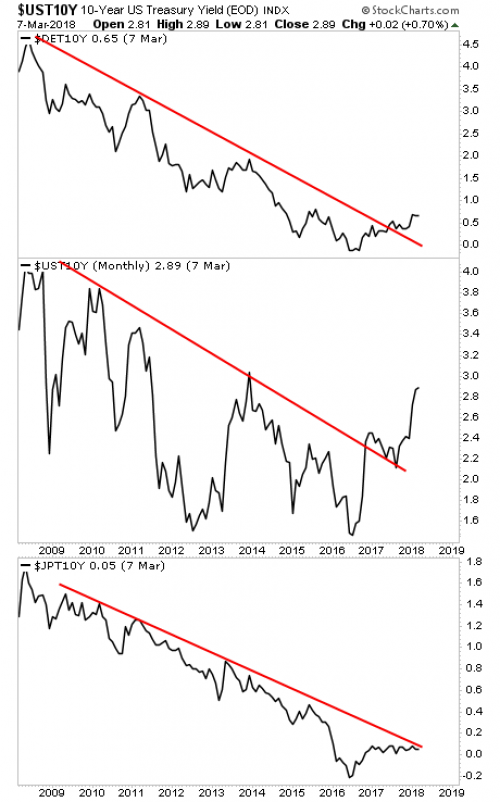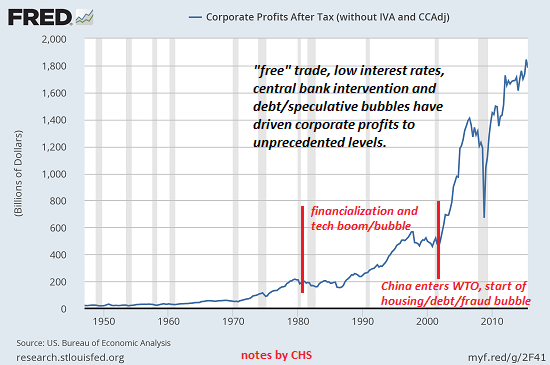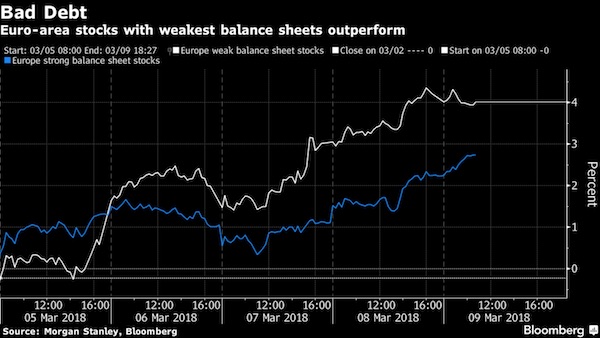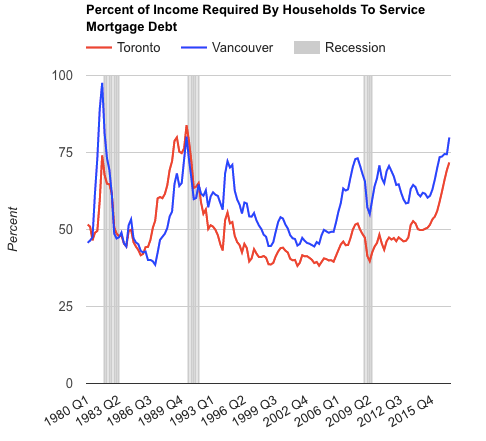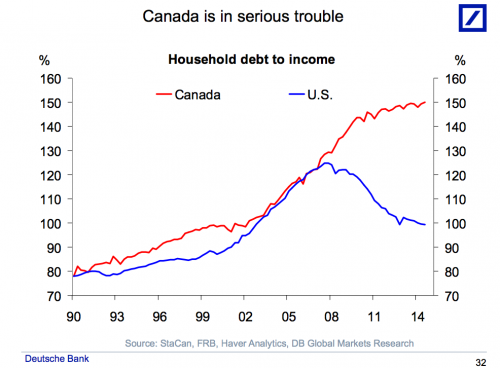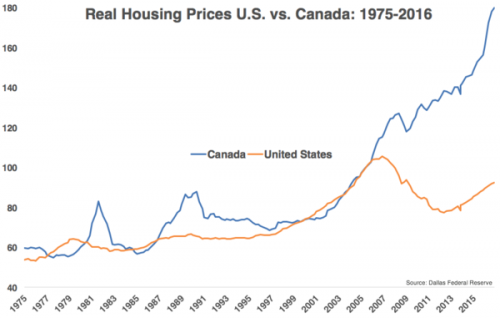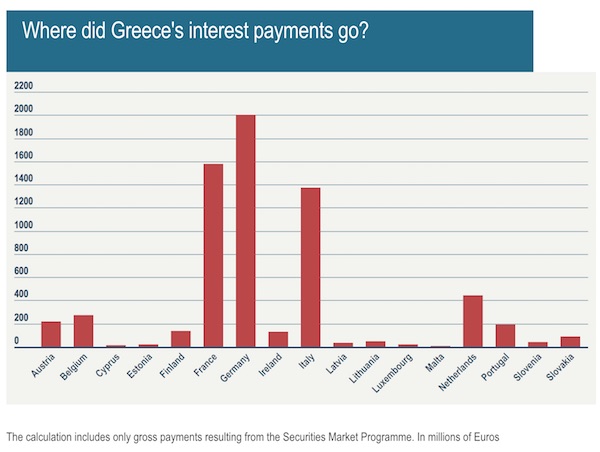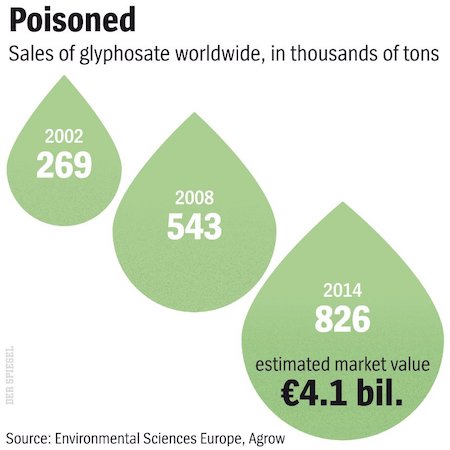
Edward Hopper The Sheridan Theatre 1937

Independence from what? Reality?
• Draghi Worries About Fate Of Fed’s Independence (MW)
Concerns about central-bank independence are on the rise.Take, for example, the cover of this week’s edition of the Economist. And while not solely a U.S. concern, a steady stream of complaints by President Donald Trump about the Federal Reserve’s earlier string of interest-rate hikes and his announcement he would nominate Stephen Moore and Herman Cain — both widely criticized as unqualified and likely to act at the behest of the White house on policy decisions — to the central bank’s governing board have sparked fears the central bank’s policy independence could be at risk. (Four Republican senators have said they would vote against Cain if he were formally put forward, likely sinking his chances.)
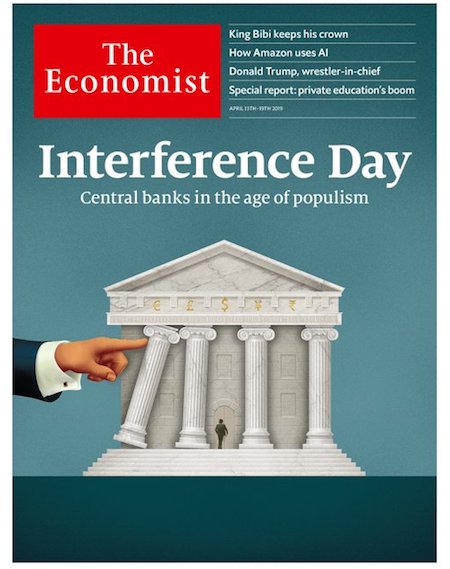
On Saturday, European Central Bank President Mario Draghi appeared to take notice: ‘I’m certainly worried about central bank independence in other countries, especially…in the most important jurisdiction in the world.’ Draghi’s remarks, as reported by Reuters, came at a news conference at the spring meetings of the IMF and World Bank in Washington. They also marked a rare instance of a central banker opining about the operations of a foreign central bank. “If the central bank is not independent, then people may well think that monetary policy decisions follow political advice rather than objective assessment of the economic outlook,” said Draghi.

Amid all the loud news, both Canada and Australia are slipping fast.
• The Most Splendid Housing Bubbles in Canada Deflate (WS)
Canada’s housing markets barely dipped during the Financial Crisis when US housing markets ran into deep trouble, causing the Mortgage Crisis that begat all kinds of other crises. Canadian homeowners and banks watched the mess from across the border and shook their heads. But now, after an 18-year housing boom, the downturn has arrived in Vancouver and Toronto, among the formerly hottest housing bubbles in the world.
The Teranet-National Bank House Price Index tracks single-family house prices, based on “sales pairs,” similar to the S&P CoreLogic Case Shiller index for US housing markets. It compares the sales price of a house in the current month to the prior sale of the same house years earlier. Using “sales pairs” eliminates the issues that affect median-price indices. But the median-price data for Vancouver is a lot more disconcerting than the Teranet data. So let’s compare how Vancouver’s housing bubble stacks up against the legendary but now also deflating housing bubble in San Francisco.

House prices in the Greater Toronto Area fell 0.3% in March from February and are down 4.3% from the peak in July 2017, the steepest 20-month decline since May 2009. From January 2002 through the peak in July 2017, the index soared 218% — meaning that house prices more than tripled. But that pales compared to Vancouver, where house prices more than quadrupled. I converted this Teranet index for Toronto house prices to “percent-change since January 2002” and overlaid the insane mind-boggling housing bubble in the San Francisco Bay Area, and it shows just how majestic the 18-year Toronto housing bubble has been:
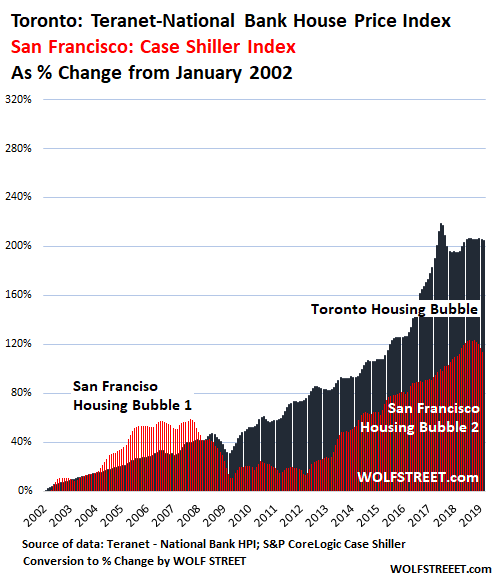

European elections in Britain do seem surreal.
• UK Tories Face European Elections Drubbing (Ind.)
The Conservatives are facing a humiliating defeat at the European elections next month after support for the party slumped to its lowest level since 2013, according to a new poll. The survey shows the Tories on just 28 per cent when it comes to general election voting intention – a four-point fall which leaves them trailing Labour on 32. When voters were asked which party they will vote for at the European elections, Theresa May’s party languished on 16 per cent, eight points behind Labour on 24. In a clear sign support for the Conservatives is crumbling over the failure to deliver Brexit, 56 per cent of people who voted to leave at the 2016 referendum said they would back Ukip or Nigel Farage’s newly formed Brexit Party during next month’s vote.
The Brexit Party is on 15 per cent, while Ukip stands at 14 per cent when it comes to European voting intention, the YouGov poll for The Times indicated. By comparison, the Lib Dems and the Greens are both on 8 per cent, while Change UK has 7 per cent support. No 10 is still hoping to get a deal through parliament in time to avoid participation in the European elections on 23 May. But the UK is formally on track to hold the poll, having informed the EU authorities ahead of Friday’s deadline that it would be taking part. Boris Johnson’s backers have suggested he may not even campaign on behalf of his party next month in an effort to show his displeasure at the UK’s involvement. “Boris won’t campaign in European elections. He believes the prospect of the UK fielding candidates is utterly preposterous,” a source told The Times.
EU Parliament voting intention (10-11 April)
Lab – 24%
Con – 16%
Brexit Party- 15%
UKIP – 14%
Lib Dem – 8%
Green – 8%
Change UK – 7%
SNP/Plaid – 6%
Other – 1%https://t.co/pBf5y4x77V pic.twitter.com/LXYVLT8hXS— YouGov (@YouGov) April 13, 2019

Something only a small group wants. But then, that’s true of all Brexit issues and ‘solutions’.
• Corbyn Told To Promise Final Say Referendum (Ind.)
Jeremy Corbyn is under intense pressure from within his shadow cabinet to give a strong commitment to a new Brexit referendum as part of Labour’s European election campaign offer. A string of senior shadow ministers are advocating a new public vote, alongside MPs from the left and right of the party, buoyed by a groundswell of support from the membership. The Independent understands Labour is now beginning the process of drawing up its manifesto with those wanting to give the public a final say on Brexit pushing the leader to make a strong bid for the Remain vote on polling day. Mr Corbyn’s team is currently engaged in talks with the Conservatives in an effort to find a Brexit compromise deal that can enjoy majority support in the House of Commons, with a referendum having been discussed during the negotiations.
The leader’s office emphasised that decisions on the manifesto were yet to be discussed, with the party simultaneously defending its majorities against the pro-Remain Change UK party run by Labour defectors and Nigel Farage’s new Brexit Party. One shadow cabinet source told The Independent: “We can’t credibly agree to any deal unless there is a confirmatory referendum attached to it. “We should be telling people about that, the support is there to be had.” The European elections are set to become a rerun of the 2016 referendum campaign with parties positioning themselves along the Brexit spectrum from Leave to Remain.

Party before country.
• It’s The UK Political System, Not Just MPs, That Is Failing (G.)
Brexit has prompted a recurring nightmare among an increasingly incredulous population: our very own Groundhog Day. Two weeks after the EU granted us an 11th-hour extension to prevent us crashing out without a deal, we are back in exactly the same position. The only thing standing between us and next Friday’s cliff edge is the hope the EU gifts us another extension. Meanwhile, the political turmoil engulfing the country worsens, the two main parties increasingly consumed by division and disarray and the political leadership we so desperately need to avert crisis as elusive as ever. It’s hard to believe that the Westminster model of democracy was one prized by constitutional theorists for the stability it purportedly delivers. As the stakes get higher, our political system has proved less and less capable of delivering a resolution to the gridlock that has infected Westminster.
Brexit has been a story of the favouring of party management over the national interest. From the very beginning, Theresa May’s approach to Brexit – from her premature decision to trigger article 50 to her red lines on freedom of movement and the customs union – has been driven not by a strategy to unite the country in the wake of a divisive referendum but to keep her Brexit ultras on side. Only now it has become clear that there are MPs in her party so fanatically dogmatic that they would rather hold out for no deal than vote for her deal has she opened compromise talks with Labour. But Labour emerged from the talks on Friday complaining that no changes to the political declaration were on offer, suggesting that this move may have been more about trying to lay blame for any further delay on the opposition.
Labour’s strategy has been no less determined by party interest. Jeremy Corbyn has kept a position of barely credible ambiguity for as long as possible to avoid alienating any of its voters. Labour has maintained the charade that it could deliver a Brexit deal that delivers all the benefits of EU membership with none of costs. And Labour has failed to provide any leadership support for a confirmatory referendum on any Brexit deal, with the shadow cabinet split on the issue. Time is running out for Labour to decide once and for all whether it will properly swing its weight behind a referendum. Thanks to the mess the Tories are in, Corbyn is in a position of power, if he only chooses to use it.

Another excellent essay from Jonathan Cook.
• UK Media, MPs Unveil Latest Assange Deception (Cook)
[..] the public conversation in the UK, sympathetically reported by the Guardian, supposedly Britain’s only major liberal news outlet, is going to be about who has first dibs on Assange. Here’s the first paragraph of the Guardian front-page article: “Political pressure is mounting on [Home Secretary] Sajid Javid to prioritise action that would allow Julian Assange to be extradited to Sweden, amid concerns that US charges relating to Wikileaks’ activities risked overshadowing longstanding allegations of rape.” So the concern is not that Assange is facing rendition to the US, it is that the US claim might “overshadow” an outstanding legal case in Sweden. The 70 MPs who signed the letter to Javid hope to kill two birds with one stone.
First, they are legitimising the discourse of the Trump administration. This is no longer about an illegitimate US extradition request on Assange we should all be loudly protesting. It is a competition between two legal claims, and a debate about which one should find legal remedy first. It weighs a woman’s sexual assault allegation against Assange and Wikileaks’ exposure of war crimes committed by the US military in Iraq and Afghanistan. It suggests that both are in the same category, that they are similar potential crimes. But there should only be one response to the US extradition claim on Assange. That it is entirely illegitimate. No debate. Anything less, any equivocation is to collude in the Trump administration’s narrative. The Swedish claim, if it is revived, is an entirely separate matter.
[..] In another article on Assange on Friday, the Guardian – echoing a common media refrain – reported as fact a demonstrably false claim: “Assange initially took refuge in the Ecuadorian embassy to avoid extradition to Sweden.” There could be no possible reason for its reporters to make this elementary mistake other than that the Guardian is still waging its long-running campaign against Assange, the information revolution he represents and the challenge he poses to the corporate media of which the Guardian is a key part.
[..] Assange was previously wanted for questioning, and has never been charged with anything. If the Swedish extradition request is revived, it will be so that he can be questioned about those allegations. I should also point out, as almost no one else is, that Assange did not “flee” questioning. He offered Swedish prosecutors to question him at the embassy. Even though questioning overseas in extradition cases is common – Sweden has done it dozens of times – Sweden repeatedly refused in Assange’s case, leading the Swedish appeal court to criticise the prosecutors. When he was finally questioned after four years of delays, Swedish prosecutors violated his rights by refusing access to his Swedish lawyer.

First amendment anyone?
• American Values: Embassies Are For Chopping Up Journalists (McDonald)
202310Fair-minded people across the world have rightly condemned the US-ordered arrest of Julian Assange. However, few have noted how it fits part of a pattern of American hypocrisy when it comes to the treatment of journalists. Only six months ago, Jamal Khashoggi was murdered and hacked to pieces by Saudi agents at the kingdom’s consulate in Istanbul. He was a columnist at the Washington Post and editor-in-chief of the Al-Arab News Channel, known for his sharp criticism of the illegal US-backed Saudi war on Yemen. Despite a CIA conclusion that Crown Prince Mohammed bin Salman ordered the gruesome assassination, President Donald Trump stood by his ally and no meaningful sanctions or penalties were directed towards Riyadh.
Turkey itself remains a NATO member, and close US partner, despite holding more journalists behind bars than any other nation on earth. This figure stood at 68, at the end of last year, around one-quarter of the global total of 251. Now we have the indictment of Assange, which seeks to criminalize basic functions of journalism. For instance, keeping sources anonymous or deleting records of conversations. Indeed, it also appears to be a breach of America’s own First Amendment. He has been targeted by Washington for exposing evidence of appalling atrocities, carried out by the US military, in Iraq and Afghanistan. And, as a result, Assange sought sanctuary in the small London embassy of Ecuador. What followed was relentless pressure on Quito to reverse the asylum it granted the Wikileaks founder and it culminated in his arrest.

“That would forestall extradition for long enough for Jeremy Corbyn to become PM, at which point extradition would be refused. But it may be just all screaming chaos.”
• Assange Is In The Dock, But Investigative Journalism Is On Trial (Crikey)
Team Assange had a defence on the jumping bail thing: “Your honour, my client had a reasonable fear that from remand he would be extradited to the US.” That was received reasonably. “Also that the previous presiding judge Lady Arbuthnot, did not recuse herself …” That was not. “You had ample time to raise this issue, and now you are traducing the reputation of a fine judge…” Snow went on. I thought of Peter Cook’s great monologue of the summing-up of the Jeremy Thorpe trial: “You have ruined the reputation of one of the most pretty defendants.” Once Assange had been found guilty of skipping bail, it got even weirder. “Your situation is a product of your narcissism,” said the magistrate clearly riled. He did not want the situation of Justice Lady Arbuthnot further explored. I am happy to do so.
Lady Arbuthnot, who ruled on the lawfulness of Assange’s continued criminalisation in the UK in 2015, is the wife of Lord Arbuthnot, a Conservative who has held multiple defence industry posts over the last two decades. This sally got short shrift, but it seemed to me intended to do so. Although when I asked a member of the legal team how it had all gone, they said “well, you saw that shit show in there”. So perhaps not. Assange is now on remand awaiting sentencing for the fleeing bail charge — the Magistrates Court having transferred it to the Crown Court, so a larger maximum sentence of 12 months instead of six, can be awarded. Is that a plan too? That would forestall extradition for long enough for Jeremy Corbyn to become PM, at which point extradition would be refused. But it may be just all screaming chaos.


“Of course, the idea that Moreno is handling the economy brilliantly, but somehow also needs over $10 billion dollars in loans is never addressed.”
• The Obvious Dirty Dealings Behind Julian Assange’s Arrest (OG)
The US has been planning to have Julian Assange handed over for a longtime, that much is obvious. Mike Pence, the Vice President, was visiting Ecuador last year, notionally to discuss the Venezuela situation, and trade. But it was fairly obvious at the time, and even more so now, that they were discussing the details of Assange being handed over to UK authorities, and eventually extradited to the US. “Trade”, indeed. In terms of quid pro quo, the situation is clear-cut – In February, Ecuador got a $4.2 BILLION loan approved by the International Monetary Fund (amongst other pay-outs). Reuters reported on February 19th of this year:
“Ecuador has reached a $4.2 billion staff-level financing deal with the IMF, President Lenin Moreno said on Wednesday, as the Andean country grapples with a large fiscal deficit and heavy external debt. The country will also receive $6 billion in loans from multilateral institutions including the World Bank, the Inter-American Development Bank, and the CAF Andean development bank…” So, less than 2 months ago, it was announced Ecuador was going to receive over 10 billion dollars of loans. Where all that money will eventually end up is anyone’s guess, it certainly isn’t being spent on infrastructure or state enterprise: “Moreno has begun to implement an austerity plan that includes layoffs of workers at state-owned companies and cuts to gasoline subsidies, also plans to find a private operator for state-run telecoms company CNT and other state-owned firms.”
President Moreno has already been the subject of numerous corruption accusations. So these “loans”, nominally for “[creating] work opportunities for those who have not yet found something stable”, could more realistically be described as “a pay-off”. More than just money, Lenin Moreno has been gifted something all insecure third-world leaders crave: Western approval. The Economist ran a story on April 12th, the day after Assange was arrested, praising Lenin Moreno’s economic policies, and blaming the previous administration for the “mess” that Moreno has to clear up. (Of course, the idea that Moreno is handling the economy brilliantly, but somehow also needs over $10 billion dollars in loans is never addressed. A tiny logical contradiction compared with the nonsense the MSM dish-up on a daily basis).

Expect it to be used against Assange.
• Anonymous Attacks Continue Against Ecuadorian Government Websites (Cassandra)
Over 30 websites belonging to the Ecuadorian government are now offline — some of them defaced — in protest of the arrest of WikiLeaks founder Julian Assange. The hackers are calling their efforts #OpEcuador, and are also promoting #OpUS and #OpUK. The United States and United Kingdom have not yet been hit with any cyber attacks, that we know of. It is important to note that none of this was directed by WikiLeaks or Assange himself. Supporters are acting on their own with the attacks. A data dump from the hackers warns that “Ecuador Government websites has been taken #Offline with 1 Direct attack. There are few most important websites that’s still down at this time. If some of their servers comes up again, we will fire again to take them down!”

Websites that have been hit include the Central bank of Ecuador, their Ministry of Interior, the Ecuadorian Assembly in UK and the main website for the Government of Ecuador — mot of which had been down for over twelve hours by Saturday evening. The hackers primarily appear to be speaking and coordinating in Spanish — though one of the data dumps was in Indonesia. A Twitter account belonging to the hackers stated that if the websites come back online they will “burn their servers.” The hacking group also called for other supporters to join them.
An InfoSec expert and Assange supporter who has been monitoring the situation told the Gateway Pundit that he is concerned that the attacks will be used against Assange by the media. “My opinion is that it’s deserved karma, but it could enable the anti-Assange media to divert attention away from Julian’s value to journalism by wrongly associating him with reckless hacktivism culture.” He also expressed concern about there being collateral damage within the large data dumps that are being posted online. Other supporters expressed similar concerns, though many still agreed that the attacks are warranted.




